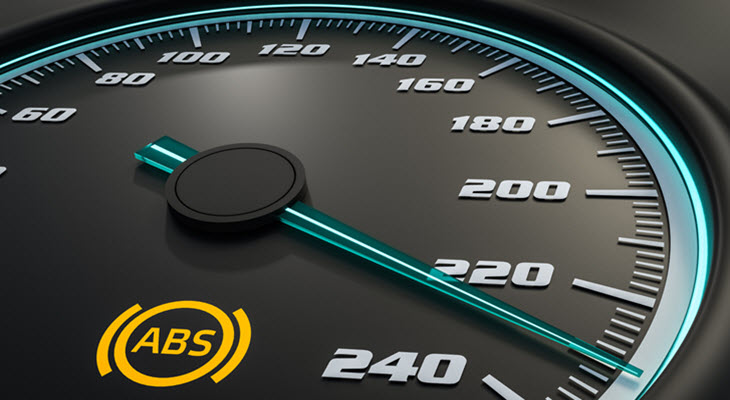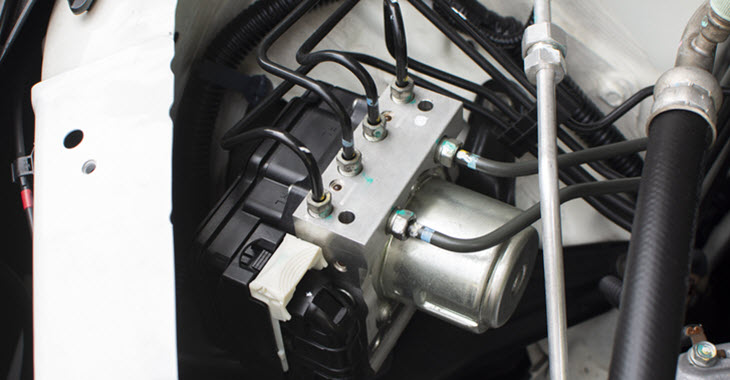
What Leads to Toyota ABS Failure in Lowell?
by Mechanics Direct August 13, 2020The ABS system of your Toyota is one of the components of your car that doesn’t come into play until it’s really needed, and if it malfunctions during this time, it’s too late to fix. When your Toyota’s ABS system goes on the fritz, it’s essential that you bring your vehicle into a mechanic as soon as possible to ensure the safety of yourself and everyone else on the road.
Your ABS System
The ABS system of your vehicle is made up of three basic components: the ABS module, ABS sensors on every wheel, and your ABS light. This warning light alerts you when one part of your ABS needs mechanical attention. The sensors are responsible for reading wheel speed, while the module rapidly pumps your brakes in the event of a skid or loss of traction.
If your ABS system malfunctions, there are several dangers you may face if you brake too hard, too fast. For instance, you may skid more easily or lose traction in even ideal conditions. However, one of the biggest dangers is the threat of hydroplaning, where your vehicle’s wheels lose contact with the road during periods of light run or when you drive through puddles.
For your safety, it’s crucial that you know the signs of a failing ABS before you’re put in conditions where your ABS is required on demand to keep you out of danger.
Symptoms of a Failing ABS
There are several symptoms that your Toyota will give off as the ABS system starts to fail. It’s critical for drivers to pay attention to these warning signs as they happen and not wait until it’s too late to address the issue.
Flashing or lit ABS light
The most common sign of an ABS issue is when the ABS light on your dashboard comes to life. However, this light does not necessarily mean there is a problem with your ABS itself, but possibly one of the ancillary components.
Sticking or unresponsive brake pedal
These rarely happen suddenly, but rather over a period of time. If you notice that your brake pedal seems to take more effort to push or does not push in at all, your vehicle is becoming unsafe to drive and should be seen by a mechanic as soon as possible.
Brakes locking up
The purpose of the ABS is to keep your brakes from locking up. If your brakes suddenly lock, especially in normal driving conditions, this is a huge red flag that something is seriously wrong with your ABS system. Your vehicle needs to be towed, not driven, to your trusted mechanic immediately.
Causes of a Failing ABS System
Frequently, a failure of the ABS system is not a failure of the system itself. The most common single cause of ABS issues in Toyota is contamination of the sensors. This occurs when road debris or metal shavings (typically brake dust) build up in the sensors over time, which makes them less effective at their job.
It’s also possible for the wiring of your ABS sensors to be damaged over time, either from rough road conditions or normal wear and tear. When this occurs, your ABS may work most of the time or very rarely, depending on the location and extent of the damage.
In the event of severe neglect or corrosive conditions, it’s possible for your brake fluid to become contaminated with debris, mineral buildup, or other impurities. In these instances, your hydraulic control unit may fail, which is a serious issue that requires immediate attention.

What to Do if Your ABS Fails
If you notice any of the signs of a failing ABS, bring your vehicle to Mechanics Direct. We proudly service car owners in the communities of North Chelmsford, Chelmsford, Dracut, Tyngsborough, Westford, and Lowell, MA. Our trusted mechanics have been the greater Lowell, MA area for over 23 years.
All vehicles and major services come with a complimentary loaner or shuttle ride, a 3-year, 36,000-mile nationwide warranty, and the option for one of our technicians to text you the results of our findings. When you have your Toyota serviced by Mechanics Direct, you can trust that you’ve taken your vehicle to the best for repairs and maintenance.

 MON – FRI: 8:00 AM – 5:00 PM
MON – FRI: 8:00 AM – 5:00 PM
 Mechanics Direct is rated 4.6 out of 5 stars
Mechanics Direct is rated 4.6 out of 5 stars Text Us
Text Us